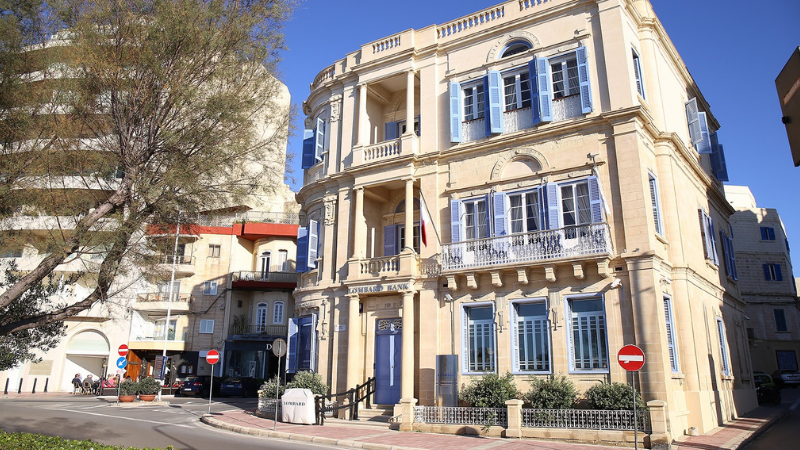Malta’s passports fund, known formally as the National Development and Social Fund (NDSF), has not yet divested of its shares in Lombard Bank, in spite of public announcements made in 2018 in which the NDSF stated it would start reducing its shares in the bank.
Four years down the line, the NDSF still maintains its 49.01% shareholding in the bank, by far the majority shareholder in Lombard Bank. Other shareholders include Virtu Holdings (9.89%), GlobalCapital Life Insurance Ltd (now called Lifestar Insurance plc) (5.6%) and First Gemini plc (5.31%), according to Lombard Bank’s latest set of annual accounts.
Questions were sent to the NDSF, Lombard Bank and the Malta Financial Services Authority (MFSA) to determine what had occurred of the plans announced in 2018. No responses were received from the NDSF by the time this article was published.
A spokesperson from Lombard Bank redirected this newsroom’s questions to the Malta Stock Exchange’s public listings and the bank’s own public data. No public announcements relating to the listing of shares were found on either website.
A spokesperson for the MFSA stated that “all supervisory work carried out by the Authority on any of its licensed entities is carried out with full respect to confidentiality requirements”, adding that “given the sensitive nature of our work, we cannot divulge the requested information”.
The qualifying shareholding still owned by the NDSF was originally acquired in March 2018 for an undisclosed price, with news reports referring to how one of Lombard Bank’s previous shareholders, Cyprus Popular Bank Co Ltd, were forced to sell their stake following a bailout from the Cypriot government.
Reports in 2018 had estimated that the qualifying shareholding taken up by the NDSF was roughly €50 million given that the 49% of shares formerly owned by Cyprus Popular Bank were valued around that mark when bidders first began expressing interest in acquiring the stake.
While at least 20 bidders had submitted their interest in acquiring the shares, the shortlisting process had stalled when bidders were left in the lurch without the relevant information required to submit their bids. While no formal reason was ever given for this, news reports had suggested it was linked with the fact that Lombard Bank owns Redbox Ltd, the holding company which is the majority shareholder behind MaltaPost’s privatisation back in 2002.
Cypriot newspapers had alleged that the Maltese government had held up the process given that the postal service is one that caters for a national interest, with no further details provided on the Maltese government’s plans.
Former Central Bank governor Francis J. Vassallo had expressed concern over the NDSF’s controlling ownership of Lombard Bank. Vassallo had described the decision as interference in the banking sector, expressing his doubts about the government’s description of the controlling ownership as “an investment” given that such an investment would amount to a minor shareholding, not a controlling one.
In 2017, money from Malta’s golden passports scheme was also used to buy up a 2.91% (now down to 2.88%) stake in Bank of Valletta, a transaction that cost €21.8 million. This shareholding is in addition to the government’s direct 25% shareholding and another 0.48% held by government-owned Malta Government Investments Ltd.
Who administers the passports fund?
The NDSF is formed as a government agency administered by a board of governors consisting of five members each appointed by the prime minister.
In June of last year, The Shift published an article detailing Prime Minister Robert Abela’s decision to hand over the reins of the NDSF from former chairman David Curmi to Jonathan Cardona, one of disgraced former prime minister Joseph Muscat’s closest aides.
Former Labour MP Maria Camilleri and Joseph Zrinzo, the father of Parliamentary Secretary for EU funds Stefan Zrinzo Azzopardi, also sit on the same board of the supposedly autonomous fund. Zrinzo was dismissed from Bank of Valletta’s board of directors after failing a ‘fit-and-proper’ test by the European Banking Authority.
The board also includes Monica Farrugia, a member of the Labour Party executive and a close associate of Jonathan Cardona at the Community Malta Agency, and James Grech, who served as chief of staff to Parliamentary Secretary for citizenship Alex Muscat up to a few months ago.















Grey Listing going into the darker shades of grey?
It is somewhat puzzling that there has been no public discussion of the Government’s manifest interference in the financial sector. Government is the largest shareholder in and dominates the governance of the BoV – the country’s biggest bank. A quick look at the assets held by the BoV shows in effect that it is the Government’s “pocket bank”. No wonder it finds itself in the straits it is in. And it is no fault of Mr. Hunkin. The story about Lombard is well set out here.